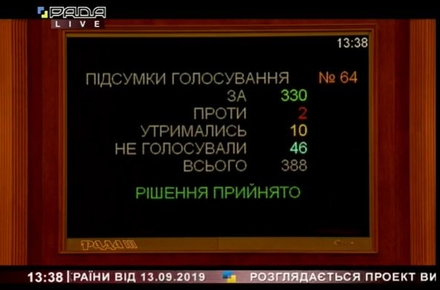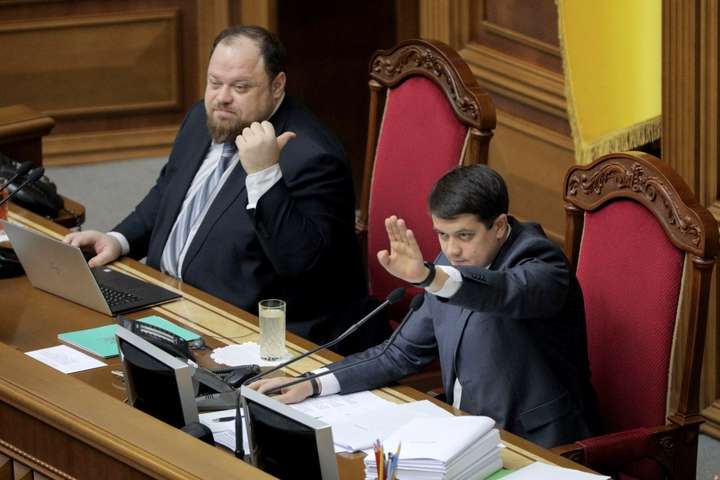On 23 December, President Volodymyr Zelenskyy signed a bill that grants the status of combatants and provides social guarantees to volunteers who defended Ukraine back in 2014 in the early stages of the war in the eastern region of the Donbas. They often were not properly registered in the regular army and police detachments when the war started. Therefore, it was hard for them to obtain the official status of combatants later.
Among other long-awaited laws adopted in the last two months were:
- legalization of amber excavation,
- the law on impeachment with presidential amendments,
- the new Electoral Code,
- a law that enables criminal investigation against people’s deputies,
as well as a law prohibiting plastic bags.
The most controversial issues, such as the opening of the land market or changes to the Constitution regarding decentralization, are being discussed for several months now. Even Dmytro Razumkov, chairman of the Verkhovna Rada recognized that “this can not be a fast decision” which signifies a significant change from the initial turbo-mode towards a normal style of work from September to December.
Amber digging is legalized
Earlier, no legal procedure existed to reserve land plots for digging amber in northeastern oblasts of Rivne, Volyn, and Zhytomyr. Police officers and officials received bribes and tolerated unauthorized excavations. Establishing transparent and same rules for all in this industry was among the most desired public demands.
The new law introduces a mechanism of land reservation for amber digging. The land is reserved through open online auctions using the public e-procurement system Prozorro that has already saved billions of dollars that were earlier lost to corruption.
Read also: Punishment or well-designed institutions: what will eliminate corruption in Ukraine?
Also, the law establishes criminal liability for the illegal extraction, sale, purchase, storage, transportation, and processing of minerals. The legislature finally makes a clear distinction between the legal and illegal extraction of amber. The question remains about the penalties that are not severe enough to prevent illegal activity; the mildest punishment is a fine worth $2000 that is unlikely to stop criminals. Nonetheless, imprisonment is also mentioned in the legislature as a possible option.

Senior military ranks to comply with NATO standards
Simple but important for further NATO integration was the bill eliminating post-Soviet officer ranks in the military. Currently, the draft law is adopted in the first reading but it is expected to get the final approval without major discussion in the Parliament. This is yet another legislation among dozens of those adopted earlier to introduce NATO standards in the Ukrainian army.
More laws to reform the army are supposed to be adopted in the future. Among them will be the new legislature on the territorial defense announced by the deputy secretary of the Security and Defense council, Serhiy Kryvonos. The new structures would include and prepare all citizens regardless of age. Mr. Kryvonos stressed:
At this stage, the territorial defense is probably one of the most important elements of national security. We, as the military… clearly understand that territorial defense is an opportunity to counter the aggression of our northern neighbor [Russia], and most importantly, it can stop the desire to commit this aggression. If the Ukrainian army at this stage can at some point lose in the open aggression to the army of the Russian Federation, and we understand that this is possible, then we have the territorial defense - trained Ukrainian people. And the Russian army will never be able to defeat the Ukrainian people that are prepared.
MPs to be probed but only by the decision of president-controlled Prosecutor General
On 3 September, the Verkhovna Rada amended the Constitution to lift parliamentarian immunity for prosecution. However, the immunity remained in the Criminal Code, making any investigation against a people’s deputy impossible.
The new legislature meant to lift this obstacle actually made it worse. The main argument against the new legislature is that only one person in the country would be able to open an investigation against an MP – the Prosecutor General, who is appointed by the President. This creates a possibility for blackmail – the case could be opened or not depending on the preferences and intentions of the President. Oleksandra Ustinova from the opposition Voice political party is among the vocal critics of the law.

Read also: Ukrainian MPs strengthened their immunity from prosecution by adopting a bill meant to lift it
Despite calls to veto the bill, President Zelenskyy signed it.
Impeachment of president enabled, but president's amendments add more conditions to launch it
Like in the case of deputies immunity, the Ukrainian Constitution included an article on impeachment but didn’t properly specify how parliament should investigate the case to launch the process. A special law on the Provisional Investigative Commissions was needed.
The previous Parliament already adopted such a draft law on 6 June 2019. However, Zelenskyy vetoed that bill, claiming that it didn't clearly determine the issues that may be investigated by the Commission. President’s proposals to specify them were included in the newly-adopted law.
The changes were rather minor and evoked little public attention. The law itself makes impeachment procedure finally possible, covering yet another gap in Ukrainian legislation.
New Electoral Code establishes proportional system with open lists for parliamentary elections
Half of the Ukrainian Parliament is formed by a party lists vote, another half of the deputies get elected in the single-mandate or "majoritarian" constituencies. The new Electoral Code puts an end to the latter system, which was blamed for possibilities to bribe voters. Civil society requested this change for years.
The previous Parliament adopted the new Code in its last days and, just like in the case of the impeachment bill, Zelenskyy vetoed it, claiming that the Code needed minor corrections. It seems that such decisions of the President were more about populism, aimed at the appropriation of laws adopted by previous authorities, then about some real disagreement.
In any case, the finally adopted and amended Code, just as its vetoed original, introduces a fully-proportional system with open lists where voters could vote not only for the party but also for its particular representatives. The "radicality" of the changes proposed by Zelenskyy and accepted by the new Parliament is well demonstrated by the fact that the "protected" party list that is not chosen by the voters has been reduced from ten to nine candidates.
Oleksandr Chernenko, one of the authors of the original text says that the new text was amended with some violations of parliamentary regulations. MPs outside of the relevant committee couldn’t propose changes for the bill. This gives grounds for declaring the Code unconstitutional by the Constitutional Court in the future and makes the success story somewhat fragile.

Plastic bags to be prohibited from 2022
This least controversial law isn't ground-breaking, but it's very important for the environment. The bill prohibits the distribution of plastic bags up to 50 microns thick at retail and restaurant facilities from 1 January 2022. Such restrictions do not apply to biodegradable plastic bags and ultra-light plastic bags intended for packaging and (or) the transportation of fresh fish and meat. The law also bans the distribution of oxo-disintegrating (oxo-biodegradable) plastic bags. Such bags do not entirely decompose but merely disintegrate to micro pieces of plastic.
Most controversial issue: proposed amendments on “decentralization”
In 2015, when Petro Poroshenko’s party tried to amend the Constitution to meet the requirements of the Minsk process of decentralization and granting a "special status" to Russia's puppet "republics" in eastern Ukraine, protests were held near the Parliament resulting in four deaths. This issue was never raised again until Zelenskyy returned from the Normandy Four summit and proposed his version of amendments.
These proposals contain two highly-criticized issues.
First, the Verkhovna Rada gets the opportunity to determine the legal status of administrative-territorial units, be it oblast, district or city, by a simple law adopted by a plurality voting instead of the voting that requires the approval of the constitutional majority of the parliamentarians. Such a practice would eliminate the whole importance of the Constitution as the main law. Moreover, it may de-facto disintegrate the country, leading to constant disagreements regarding the statuses of certain areas – this is what Kremlin had needed for years.
Only 226 votes, not 300 – and no need to mention the "special status of Donbas" separately in the Constitution. The mechanism of quiet federalization would be already enshrined in the Constitution, as Putin wants. This will lead to a chain reaction and legal clutter. Why is this region is worse than that? Why can't they have a "special legal status"? wrote people’s deputy from the opposition European Solidarity party Oleksandr Honcharenko regarding the law.
Moreover, the amendments propose to institute prefects who will be appointed by the president and will oversee the local authorities and have powers to suspend the decisions of local self-government bodies. Using prefects, the president will be able to control the local authorities.
Although Zelenskyy's idea of prefects was highly criticized by opposition parties, in fact, it was copied from Poroshenko's version of the amendments nearly word for word, like most of the other text. Only the proposal of the Verkhovna Rada determining the legal status of administrative units fundamentally differs from Poroshenko's proposal.
The Parliament didn’t consider these amendments yet. Currently, the law was submitted to the Constitutional court for evaluation, according to the procedure.
Read more:
- Ukrainian MPs strengthened their immunity from prosecution by adopting a bill meant to lift it
- Zelenskyy’s changes to the Constitution (and why each Ukrainian president amends it)
- Oligarch interests in the new Ukrainian parliament
- Ukraine’s new Parliament violates regulations in its strong will to serve the people
- Ukrainian parliament reinstates responsibility for illicit enrichment
- Anti-corruption steps of Ukraine’s new parliament endorsed by activists
- Zelenskyy's MPs set new records in violating parliamentary rules

